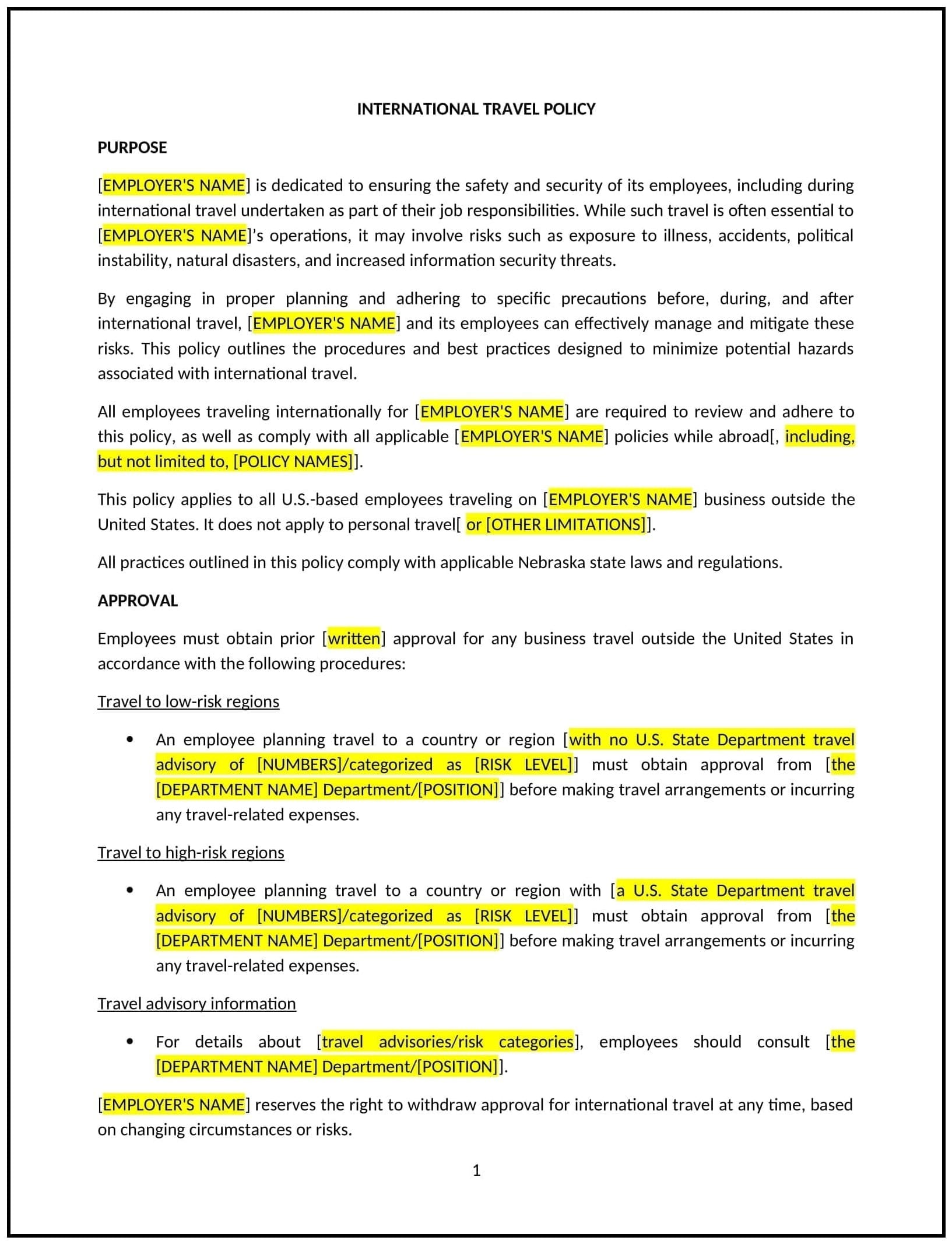International travel policy (Nebraska): Free template
Got contracts to review? While you're here for policies, let Cobrief make contract review effortless—start your free review now.

Customize this template for free
International travel policy (Nebraska)
An international travel policy helps Nebraska businesses provide guidelines for employees traveling abroad for business purposes. This policy outlines expectations for travel approval, travel arrangements, reimbursement of expenses, safety protocols, and compliance with relevant laws. It is designed to ensure that employees' international travel is safe, cost-effective, and in alignment with company goals while minimizing risks related to travel, including health, security, and legal issues.
By adopting this policy, businesses in Nebraska can manage international travel effectively, protect employees' well-being, and maintain control over travel-related expenses.
How to use this international travel policy (Nebraska)
- Define travel approval process: Clearly outline the process employees must follow to request and gain approval for international travel. This should include submission of travel requests, specifying the purpose of the trip, and any necessary documentation, such as travel itineraries or conference details.
- Specify allowed expenses: Define what constitutes reimbursable expenses for international travel, including flights, accommodations, meals, transportation, and other related costs. Specify any limits or guidelines on spending and preferred vendors.
- Set booking procedures: Outline the procedures for booking travel, including whether employees are required to use a company travel agency, preferred booking platforms, or must secure their own travel arrangements. Encourage cost-effective options without compromising employee safety or comfort.
- Address health and safety: Provide guidance on vaccinations, travel insurance, and emergency protocols for international travel. Employees should be advised to check for any health risks related to their destination and take appropriate precautions.
- Set expectations for conduct: Specify expectations for employee behavior during business travel, including adherence to company policies and ethical conduct, such as respecting local laws and cultures. Clarify any rules regarding alcohol consumption, behavior in public, or personal activities during business trips.
- Discuss security measures: Ensure that employees are informed of any potential security risks or travel advisories for their destinations. Encourage employees to follow best practices for personal security, such as avoiding high-risk areas and being aware of local safety concerns.
- Provide crisis management procedures: Establish protocols for handling emergencies, including medical incidents, accidents, natural disasters, or political unrest. Ensure employees know whom to contact in case of an emergency and how to get assistance during their travels.
- Encourage sustainability: Promote environmentally responsible travel practices, such as using public transportation or booking eco-friendly accommodations, where possible. Encourage employees to minimize the environmental impact of their travel.
- Review and update: Regularly review and update the policy to reflect changes in travel regulations, safety guidelines, and company requirements. Ensure that it remains relevant and effective in managing international business travel.
Benefits of using this international travel policy (Nebraska)
This policy provides several benefits for Nebraska businesses:
- Manages travel costs: By setting clear guidelines for travel arrangements and expenses, businesses can maintain control over travel costs and ensure that employees are making cost-effective choices.
- Protects employee well-being: With clear health, safety, and security protocols in place, businesses help ensure that employees are adequately prepared for international travel and are supported in case of emergencies.
- Improves efficiency: A well-defined travel policy streamlines the travel approval and booking process, ensuring that trips are well-organized, and employees have clear expectations regarding expenses and conduct.
- Mitigates risk: The policy helps reduce the risk of legal or security issues during international travel by setting clear expectations for employee behavior and providing guidelines for handling potential emergencies.
- Supports company objectives: By ensuring that travel aligns with business goals, the policy helps ensure that international travel is focused on achieving the company’s objectives, such as expanding business operations or attending key conferences.
Tips for using this international travel policy (Nebraska)
- Communicate the policy clearly: Ensure all employees are aware of the international travel policy and understand the procedures for requesting travel, managing expenses, and following safety guidelines. The policy should be easily accessible and included in employee handbooks or internal portals.
- Provide training for managers: Managers should be trained to review and approve travel requests efficiently and ensure that employees are following the policy. They should also be aware of the company’s health and safety requirements for international travel.
- Use technology for booking: Encourage the use of a company-approved booking tool or travel agency to ensure consistent and cost-effective travel arrangements. This can also help streamline the approval and reimbursement processes.
- Stay informed about travel risks: Regularly check travel advisories, security updates, and health recommendations for the countries where employees will be traveling. This ensures that the policy remains up-to-date with the latest information.
- Monitor and track travel expenses: Use expense management tools to track employee travel spending, ensuring that expenses remain within the set guidelines and are processed efficiently for reimbursement.